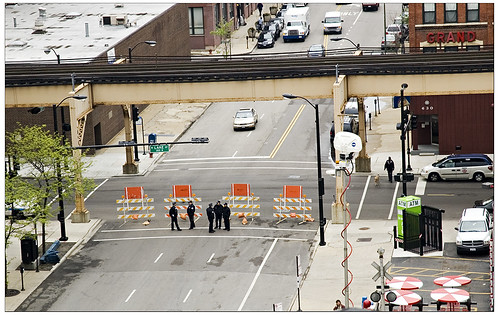Must be tough to go to work knowing a large part of your day is going to be spent telling lies.
The New Yorker: Lauren Collins - Risk Management : In the wake of a rise in substantiated instances of misconduct by its recruiters, the United States military, it was reported last month, is considering installing surveillance cameras in its recruiting stations. The military may also want to assess the tactics that its employees use in the virtual realm. This admissions season, an Army recruiter has been e-mailing recent college graduates with the offer of hundreds of thousands of dollars in scholarship money to pay for medical school, in exchange for four years of service. Nothing new there. What’s surprising is his assertion to students that they would be better off in Baghdad than in Georgetown.
a recruiter emails a possible sucker recruit
Well, consider this: there has been an average of 160,000 troops in the Iraq theater of operations during the last 22 months, and a total of 2112 deaths, that gives a firearm death rate of 60 per 100,000. The rate in Washington, D.C. is 80.6 per 100,000. That means that you are about 25% more likely to be shot and killed in our Nation’s Capitol, which has some of the strictest gun control laws in the nation, than you are in Iraq.
The potential sucker recruit didn't think those numbers added up:
Kahane recalled, “After reading it once, I felt strongly that something was wrong, but I didn’t know what.” She looked up the figures and did the math herself, and found that all the statistics in the e-mail were either outdated or incorrect, and that, even if they had been correct, Mayhugh seemed to be comparing a yearly figure for Washington with a monthly one for Iraq.(Going by Mayhugh’s numbers, there would be nearly fifteen gun murders in Washington every day. In reality, there were about three murders, of any kind, per week in 2006. In the same period, an average of sixteen American troops died each week in Iraq.)
Kimberly Thompson, an associate professor of risk analysis and decision science at Harvard’s School of Public Health, agreed, last week, to evaluate Mayhugh’s claim and found the discrepancy even starker. In her estimate, the risk of being killed in Iraq is ten times higher than the risk of being killed in Washington, D.C. “The recruiter’s e-mail message is really amazingly misleading,” she said.
It turns out, as Kahane learned with a subsequent Google search, that “D.C. is more dangerous than Iraq” is a well-worn canard. Representative Steve King, a Republican from Iowa, promulgated a variation, involving his wife’s safety, last year on the floor of the House, while Mayhugh’s paragraph was plucked, verbatim, from an e-mail that circulated in 2005. The realization that Mayhugh’s message derived—one could see, with nominal research—from a Web fallacy was dispiriting to Kahane. She had written a letter to Mayhugh, but didn’t send it. “I thought, I guess he knows the math isn’t right, so what’s the point of telling him?” she said.
Technorati Tags: Iraq, military, surveillance

